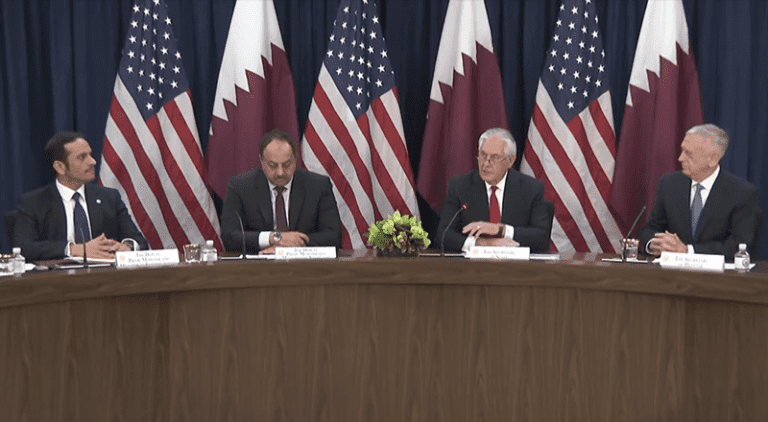
The United States and Qatar held their first annual strategic dialogue in Washington, DC, on January 30, 2018. US Secretary of State Rex Tillerson and Secretary of Defense James Mattis met with Qatari Foreign Minister Sheikh Mohammed bin Abdulrahman Al Thani and Minister of State for Defense Affairs Khalid al-Attiya; secretaries and ministers of energy, trade, and finance from both countries also participated in the meetings. This dialogue is slated to be an annual event, represents the strength of bilateral relations, and establishes “a shared vision for the future of their strategic partnership.” Above all, analysts viewed the dialogue as a successful Qatari effort to circumvent the countries imposing a blockade on it and trying to sour its relations with the United States.
A Message to the Blockading Countries
Since the beginning of the blockade in June 2017, Qatar has followed a planned strategy that separated its relationship with the United States from the mediation efforts to resolve the crisis in the Gulf Cooperation Council. This strategy rested on the belief that the blockading countries had succeeded in convincing the Trump Administration of Qatar’s responsibility for those issues, which muddled US-Qatar relations.
Qatar has pursued a committed effort in Washington since last September, resulting in a more balanced position by Trump.
Perhaps the first message from the dialogue is the one to the blockading countries whose plan in June 2017 was to isolate Qatar, based on accusations and excuses that have been refuted. These countries accused Qatar of supporting terrorism, interfering in their affairs, and building close relations with Iran. They tried to disseminate these accusations in the United States by using joint Emirati-Israeli lobbies, financed by Saudi Arabia, and coordinating with the president’s son-in-law Jared Kushner. While these accusations found some currency with President Donald Trump at the beginning of the crisis, the Departments of State and Defense rejected them, decried the blockade, and pressured Trump to take a balanced approach. The fear was that behaving otherwise would negatively impact American interests in the region, counterterrorism efforts, and challenging Iran, especially since Qatar hosts the American Al-Udeid Air Base.
Qatar has pursued a committed effort in Washington since last September, resulting in a more balanced position by Trump. What also helped were two meetings the president held with the ruler of Kuwait, Sheikh Sabah al-Ahmad Al Sabah, whose country leads Gulf mediation efforts, and the ruler of Qatar, Sheikh Tamim bin Hamad Al Thani. After meeting Sheikh Tamim in New York, Trump said that the two have “been friends a long time,” promising that the crisis would be solved “pretty quickly.” The president also expounded on his statement by stating that the US-Qatar relationship is not confined to the crisis but includes “many other things.” In a telephone conversation last January, the president and Sheikh Tamim also discussed ways to expand security and economic relations, with Trump emphasizing the importance of a strong GCC that would concentrate on fighting terrorism. He also thanked Qatar for its efforts in fighting terrorism and extremism.
It is arguably the case that the main reason for Trump’s change of heart was Qatar’s rejection of blackmail and its readiness to cooperate with the US State Department to find solutions to unresolved issues. Furthermore, had the Qatari leadership retreated in the face of the threats, it is possible that the blockade would have succeeded and the American position would have remained unchanged.
The change in Trump’s position toward the Gulf crisis and its alignment with those of the Departments of State and Defense and the intelligence services led to the US-Qatar strategic dialogue. What was noticeable was Tillerson’s and Mattis’s insistence on the centrality of resolving the crisis. Tillerson asserted that all sides should end the ongoing war of words and exercise restraint in order to avoid escalation. For his part, Mattis concluded that GCC unity “bolsters our effectiveness on many fronts, particularly on countering terrorism, defeating ISIS/Daesh, and countering the spread of Iran’s malign influence.”
While it may be early to say that the Trump Administration has a coherent strategy, It is possible to say that American sovereign institutions have rebalanced American policy toward the Gulf crisis.
The most consequential outcome of the US-Qatar strategic dialogue is the US official declaration of “readiness to work jointly with Qatar to deter and confront any external threat to Qatar’s territorial integrity that is inconsistent with the United Nations Charter.” This was an indirect reference to what Kuwait’s emir, Sheikh Sabah, had disclosed in September 2017, that his country’s efforts at mediation thwarted a military intervention in Qatar by the blockading countries. Minister of State Attiya confirmed that this indeed had been contemplated. American experts thus consider the dialogue a clear message, especially to Saudi Arabia and the United Arab Emirates, that the continued escalation with Qatar is no longer acceptable in Washington. This, they reason, is detrimental to American interests in the region and the wider Middle East and is an indication that eight months of playing on the contradictions of American policy have not produced the desired results.
The Understandings
The joint communiqué highlighted four areas of the strategic dialogue between the United States and Qatar:
- Political Cooperation. The two countries emphasized the importance of strengthening and expanding bilateral relations. They also affirmed the importance of a quick resolution to the GCC crisis, one that respects Qatar’s sovereignty and preserves GCC unity in order to face threats in the region and ensure the peaceful and prosperous future of all its peoples. The two sides also discussed regional security and stability, including ongoing conflicts in some states and joint efforts to defeat the Islamic State.
- Defense Issues. The two sides affirmed the importance of their partnership for assuring regional security and stability. The United States praised Qatar’s contributions to the American military presence in Al-Udeid Air Base. They also signed a joint communiqué on fighting terrorism and enhancing security, in addition to the American guarantee of Qatar’s safety and regional security in the face of outside threats. The two countries also discussed military sales, including Qatar’s acquisition of the most modern American military systems, valued at $24.7 billion, as well as Qatar’s plans to augment other military capabilities in coordination with the United States.Minister of State for Defense Affairs Khalid al-Attiya stated that Qatar’s “2040 Vision” features military cooperation with the United States that would include expanding Al-Udeid Air Base and building new housing and other facilities to increasing its capacity. A spokesman for the US Air Force also declared that Qatar’s proposed improvements “represent a transition from an expeditionary environment with temporary facilities, to a base with an enduring infrastructure capable of sustaining long-term operations.” Attiya also said that Qatar will build new port facilities capable of hosting American naval vessels, which will compete with Bahrain’s facilities for the American Fifth Fleet as well as with those in the United Arab Emirates. Qatar, according to Attiya, over the last few years has also purchased advanced aircraft such as the F-15, C-17, C-130G, cargo planes, Apache attack helicopters, and interceptor Patriot missile batteries. Finally, over the last few weeks Secretary Mattis confirmed that Qatar has provided logistical support to NATO operations in Afghanistan.
- Counterterrorism. The joint communiqué announced that the United States and Qatar intend to strengthen their security partnership and their joint efforts to fight terrorism and violent extremism. The two sides also revisited the Memorandum of Understanding regarding counterterrorism, which they had signed in July 2017, and the necessity of enhancing those efforts, especially in the fields of aviation security, terrorism financing, and cyber piracy.
- Trade and Investment. The two countries affirmed their commitment to strengthen bilateral trade. According to Foreign Minister Mohammed Al Thani, Qatar invests more than $100 billion in the American economy, with $10 billion in infrastructure projects. He also indicated that Qatar invests in American banks and financial instruments, the health sector, and technology. In addition, American companies are involved in the construction, energy, and services sectors, and Qatar hosts six American university annexes in its Education City in Doha.
Indeed, Qatar achieved many gains in its strategic dialogue with the United States. For the first time, the United States declared clearly and officially that it would not allow any military aggression against Qatar, a country it considers a strong and trusted regional partner especially in the contexts of security, stability, and counterterrorism. Attiya stated that the blockading countries “did not account for the United States as an institutional country, and the White House, the Department of State, and the DOD—they always consult with each other, and they run the country as an institutional country….” It is thus possible to say that American sovereign institutions have rebalanced American policy toward the Gulf crisis. However, it is early to speak of a long-term and cohesive American position in this matter because it remains difficult to gauge President Trump’s moods and his inconsistent statements regarding US foreign policy.

